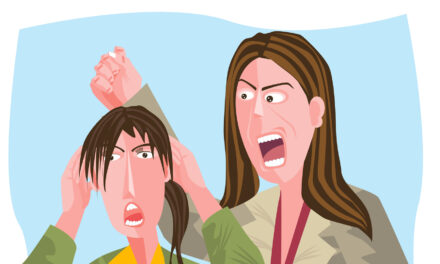Q: My daughter started first grade in a U.S. school this year, right after we moved from Japan. Within the first few minutes of the first day of school, the teacher asked her, “Where is your backpack?” and my daughter — who is just beginning to learn English — replied, “I don’t know.” This is where the loud teacher part comes in. According to my daughter, the teacher yelled at her, “You don’t know?!”
I became aware of this three days later, when my daughter became panicked about possibly making the teacher mad. She was so frightened, she started to wet her pants in school. I do not believe the teacher scared her intentionally. (She said, “I don’t yell. It’s just how I talk. It must be my background from the South.”) But I do think this happened because she spoke in too loud of a voice in a language my child did not understand. Plus, even though the school was aware that my daughter was an English language learner, the teacher didn’t know this until after the first day.
My daughter is okay now, and she’s learning and making friends. I’m not trying to have the teacher disciplined, and I don’t think she intended any harm. Rather, I am just trying to find information about what impact a teacher could have on a young child by speaking so loudly in a new language.
A: First, I’m glad to hear your daughter is doing okay, learning, and making friends. I’m sure you’re proud of her, as it’s not easy for anyone — let alone a six-year-old English language learner — to move to a new school in a new country in the middle of a pandemic. Given all those factors, I’m not surprised to hear that she found her new teacher’s loud voice scary, even if the teacher didn’t intend to upset her. Different students are going to respond to a teacher’s tone and volume differently, depending on their temperament, comfort in the classroom, history of trauma, or any number of other challenges. As for her accidents, it’s tough for any young child to self-advocate, let alone a young child who doesn’t speak English, feels intimidated by her teacher, and perhaps doesn’t even know her way around the building yet.
The teacher mentioned that she’s a naturally loud speaker and wasn’t yelling. That’s entirely possible. People may speak louder because of how they were raised. If a person grew up in a large family, for instance, they may have learned early on that they need to speak loudly if they want to be heard. They may not even be aware of their volume until someone points it out to them. There’s both a genetic and a learned component to someone’s voice, according to The National Center for Voice and Speech, which is why family members often share similar vocal habits. I’m glad that you recognize that and are giving the teacher the benefit of the doubt. You assume she meant no malice, and hopefully you conveyed the same sentiment to your daughter.
I agree with you that, ideally, the teacher would have been aware ahead of time that your daughter would be facing extra challenges and needed a sensitive touch. The school could have arranged for the teacher to email your daughter ahead of time, for instance, or paired your family with a “buddy family” with a same-age student — but that ship has sailed. The next best thing, which you have done, is to share with the school that your daughter is struggling, and to ask the teacher to adjust her approach and try to reestablish trust.
You also asked me for information about a teacher’s voice, and how their volume can affect children. According to the North American Montessori Center: “Children are “acutely sensitive to the world around them and are much more apt to pick up on how words are said rather than the words themselves. They hate to be shouted at, and even if the words are well-intended, it is the volume of the message that they hear. One only need witness a cringing child to know that voices raised in frustration or anger can do as much emotional harm as a raised hand inflicts physical pain.” In my experience, students of all ages respond best when they feel that a teacher is calm, earnest, and respectful. According to Joyce Dorado, director of the Healthy Environments and Response to Trauma in Schools program at the University of California, San Francisco, teacher-student relationships “necessarily involve a small thing that’s not a small thing, like a teacher’s voice.”
At this point, I’d maintain a positive tone when talking about the teacher, check in with your daughter to ensure she’s getting adequate support, and help her identify other “helpers” in the school building.
Click here for more Career Confidential
Have a question that you’d like Career Confidential to answer? Email contactphyllisfagell@gmail.com. All names and schools will remain confidential. No identifying information will be included in the published questions and answers.
ABOUT THE AUTHOR

Phyllis L. Fagell
Phyllis L. Fagell is the school counselor at Landon School in Washington, D.C., a therapist at the Chrysalis Group in Bethesda, Md., and the author of the Career Confidential blog. She is also the author of Middle School Matters and Middle School Superpowers, available at https://amzn.to/3Pw0pcu.










